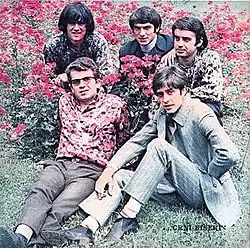Crni Biseri
Crni Biseri (Serbian Cyrillic: Црни Бисери, trans. The Black Pearls) was a Serbian and former Yugoslav rock band, notable as one of the pioneers of the former Yugoslav rock scene.
Crni Biseri | |
|---|---|
 Crni Biseri in 1968 | |
| Background information | |
| Also known as | VIS Crni Biseri, Denis |
| Origin | Belgrade, Serbia, Yugoslavia |
| Genres | Rock and roll, beat music, rhythm and blues, rock |
| Years active | 1963–80 (reunions: 1997) |
| Labels | Jugoton, PGP-RTB, Studio B, Diskos, PGP-RTS |
| Associated acts | Džentlmeni, YU grupa, Opus, Dah, Zlatni Prsti, Boris Bizetić, Rokeri s Moravu, Tunel, Vlada Džet Band |
| Past members | see the members section |
History
1963–80
The band was formed in 1963 in Belgrade, and was named after Toma Janić's film Crni biseri (Black Pearls) which dealt with juvenile delinquency. The band consisted of Goran Vukićević (acoustic guitar, keyboards, accordion and harmonica), Dragan "Krcko" Jovanović (drums) and Božović brothers, Ivan (guitar) and Slavko (saxophone). In the beginning, the band performed without a bass guitarist, but were soon joined by the bassist and singer Vladimir Janković, also known as "Vlada Džet", who got his nickname ("Džet" being a transliteration for Jet) after The Shadows bass guitarist Jet Harris. The band was soon joined by the singer Radan Valčić. This lineup of the band performed until the Autumn of 1965, when they moved to rhythm and blues and started performing in the following lineup: Goran Vukićević (guitar), Vlada Džet (bass guitar, vocals), Zoran Petković (rhythm guitar), Radan Valčić (vocals) and Dragan "Krcko" Jovanović (drums).
Crni Biseri released their debut EP in April 1966, featuring Vlada Džet's song "Ne odlazi", which was the result of the band's desire to be one of the first former Yugoslav bands to record their own songs instead of cover versions. The B-side featured a cover of Manfred Mann's "Pretty Flamingo", with lyrics in Serbian language entitled "Lepi flamingo". The band won the first place on second Gitarijada festival held at the Belgrade Sajmište (not to be confused with Gitarijada festival held in Zaječar). At the time Jovanović left the band and was replaced by Jovan "Kića" Ljubisavljević (later a Vlada Džet Band member). In 1968, Valčić left the band and was replaced by a former Duka & Čavke frontman Nenad Dukić. Dukić was a band member for only three months, and provided vocals for three cover songs released on the band's second EP (the fourth song, "Nisam više taj" was previously recorded with Valčić). After Dukić's departure, Valčić returned to the band and remained the band's frontman until 1970, when he was replaced by the former Juniori vocalist Dragan Baletić. During 1973, the band made a break in their work due to Džet's and Baletić's army obligations.
After Vlada Džet's and Baletić's return from the army, the band continued their activity without Petković. For a certain time the keyboardist Dragan Batalo performed with the band, but was soon replaced by the keyboardist and singer Dragan Rajičević (a former Juniori member). In October 1976, Ljubisavljević left the band due to his army obligations and was replaced by a former Plavi Dečaci, Duka & Čavke, Džentlmeni, YU grupa, Opus and Dah member Velibor "Boka" Bogdanović. Having released their only full-length studio album, Motorok, and the single "Ti si uvek htela sve", Dragan Baletić left the band and was replaced by a former Op Cup member Branislav "Cile" Živančević. In 1977. the band recorded a single featuring the songs "Hush Hush Maria" and "Night in Casablanca" under the name Denis. Three years later, on 1 January 1980, Crni Biseri officially disbanded.
Reunion
In 1997, the band reunited with vocalists Dragan Baletić and Branislav Živančević to perform in the club Crna Maca in Zemun. The following year, the compilation album Crni Biseri was released, featuring previously unreleased songs "Mesto pod suncem", which is the band's first studio recording, "Moja draga", "Kamena vizija", "Hey girl".
Theatre and film activities
Crni Biseri appeared in Žika Pavlović's film Kad budem mrtav i beo and in Stole Janković's film The Girl in the Park. They wrote songs for the plays of the Belgrade Drama Theatre.
Legacy
Crni Biseri song "Džudi, Džudi" was covered by Yugoslav and Serbian folk rock band Garavi Sokak in 1991.[1]
Discography
Studio albums
- Motorok (1976)
Compilation albums
- Crni Biseri (1998)
Extended plays
- Ne odlazi (1967)
- Nisam više taj (1968)
- Kišna noć (1972)
Singles
- "Moja mala ledi" / "Moj svet nije tvoj svet" (1968)
- "Tražimo sunce" / "Ram-dam-dam" (1969)
- "Poučna priča / "Čekanje" (1970)
- "Ona zna" / "Povratak" (1972)
- "Lutalica" / "Pismo devojci" (1973)
- "Večiti rok" / "Želim" (1975)
- "Dar-mar" / "Šta ću sad" (1975)
- "Džudi, Džudi" / "Nikada" (1976)
- "Mlinarev sin" / "Tiho muzika svira" (1976)
- "Ti si uvek htela sve" / "Moj brat i ja" (1977)
- "Katarina (Ne želi da živi više sa mnom)" / "Moreplovac" (1977)
- "Aspirin" / "Susret na uglu" (1978)
- "Tašta" / "Zimski dan" (1979)
Band members
- Goran Vukićević – guitar, acoustic guitar, keyboards, accordion, harmonica (1963–1980)
- Ivan Božović – guitar (1963–1965)
- Slavko Božović – saxophone (1963–1965)
- Dragan Jovanović "Krcko" – drums (1963–1968)
- Vladimir Janković "Vlada Džet" – bass guitar, vocals (1964–1980)
- Radan Valčić – vocals (1964–1968); / (1968–1970)
- Zoran Petković – guitar (1965–1973)
- Jovan Ljubisavljević "Kića" – drums (1968–1976)
- Nenad Dukić – vocals (1968)
- Dragan Baletić – vocals (1970–1977)
- Dragan Batalo – keyboards (1974)
- Dragan Rajičević – keyboards, vocals (1975–1980)
- Velibor Bogdanović "Boka" – drums (1976–1980)
- Branislav Živančević "Cile" – vocals (1977–1980)
References
- Janjatović, Petar (2007). EX YU ROCK enciklopedija 1960–2006. Belgrade: self-released. p. 88.
Bibliography
- EX YU ROCK enciklopedija 1960–2006, Janjatović Petar; ISBN 978-86-905317-1-4